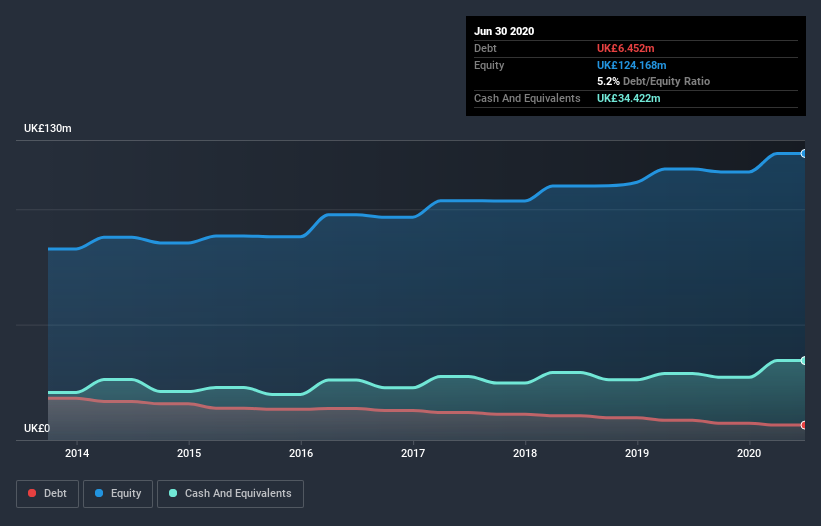London Security (LON:LSC) Seems To Use Debt Quite Sensibly

David Iben put it well when he said, 'Volatility is not a risk we care about. What we care about is avoiding the permanent loss of capital.' So it seems the smart money knows that debt - which is usually involved in bankruptcies - is a very important factor, when you assess how risky a company is. As with many other companies London Security plc (LON:LSC) makes use of debt. But the more important question is: how much risk is that debt creating?
When Is Debt Dangerous?
Debt assists a business until the business has trouble paying it off, either with new capital or with free cash flow. Part and parcel of capitalism is the process of 'creative destruction' where failed businesses are mercilessly liquidated by their bankers. However, a more common (but still painful) scenario is that it has to raise new equity capital at a low price, thus permanently diluting shareholders. Of course, plenty of companies use debt to fund growth, without any negative consequences. The first step when considering a company's debt levels is to consider its cash and debt together.
View our latest analysis for London Security
What Is London Security's Debt?
You can click the graphic below for the historical numbers, but it shows that London Security had UK£6.45m of debt in June 2020, down from UK£8.56m, one year before. But it also has UK£34.4m in cash to offset that, meaning it has UK£28.0m net cash.
How Strong Is London Security's Balance Sheet?
The latest balance sheet data shows that London Security had liabilities of UK£34.7m due within a year, and liabilities of UK£12.1m falling due after that. Offsetting these obligations, it had cash of UK£34.4m as well as receivables valued at UK£32.5m due within 12 months. So it actually has UK£20.1m more liquid assets than total liabilities.
This short term liquidity is a sign that London Security could probably pay off its debt with ease, as its balance sheet is far from stretched. Simply put, the fact that London Security has more cash than debt is arguably a good indication that it can manage its debt safely.
On the other hand, London Security saw its EBIT drop by 9.7% in the last twelve months. If earnings continue to decline at that rate the company may have increasing difficulty managing its debt load. The balance sheet is clearly the area to focus on when you are analysing debt. But it is London Security's earnings that will influence how the balance sheet holds up in the future. So when considering debt, it's definitely worth looking at the earnings trend. Click here for an interactive snapshot.
But our final consideration is also important, because a company cannot pay debt with paper profits; it needs cold hard cash. While London Security has net cash on its balance sheet, it's still worth taking a look at its ability to convert earnings before interest and tax (EBIT) to free cash flow, to help us understand how quickly it is building (or eroding) that cash balance. During the last three years, London Security produced sturdy free cash flow equating to 73% of its EBIT, about what we'd expect. This free cash flow puts the company in a good position to pay down debt, when appropriate.
Summing up
While it is always sensible to investigate a company's debt, in this case London Security has UK£28.0m in net cash and a decent-looking balance sheet. The cherry on top was that in converted 73% of that EBIT to free cash flow, bringing in UK£20m. So is London Security's debt a risk? It doesn't seem so to us. There's no doubt that we learn most about debt from the balance sheet. But ultimately, every company can contain risks that exist outside of the balance sheet. For instance, we've identified 1 warning sign for London Security that you should be aware of.
Of course, if you're the type of investor who prefers buying stocks without the burden of debt, then don't hesitate to discover our exclusive list of net cash growth stocks, today.
This article by Simply Wall St is general in nature. It does not constitute a recommendation to buy or sell any stock, and does not take account of your objectives, or your financial situation. We aim to bring you long-term focused analysis driven by fundamental data. Note that our analysis may not factor in the latest price-sensitive company announcements or qualitative material. Simply Wall St has no position in any stocks mentioned.
Have feedback on this article? Concerned about the content? Get in touch with us directly. Alternatively, email editorial-team@simplywallst.com.



